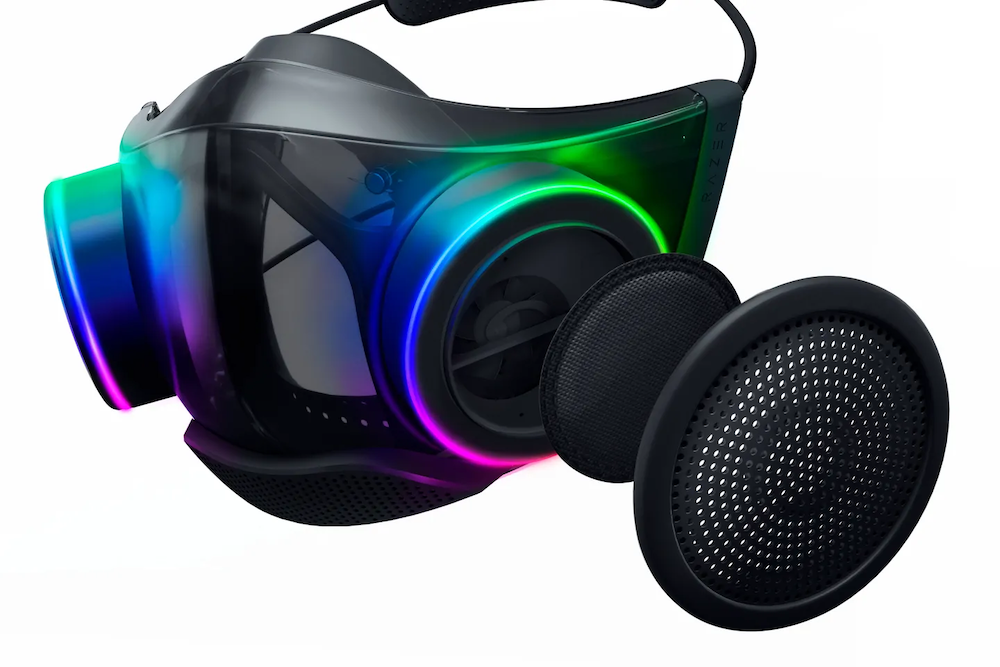Surprise! That futuristic COVID mask was even sketchier than we thought
Razer owes $1 million in refunds for false N95 claims about Zephyr.

The Federal Trade Commission has ordered Razer to issue over $1.1 million in full refunds for its Razer Zephyr facemasks after alleging the PC gaming accessory company falsely billed its futuristic “wearable air purifier” as equivalent to N95-grade respirators. In truth, the FTC says Zephyr’s makers never even submitted their product for testing to either the FDA or the National Institute for Occupational Safety and Health (NIOSH).
Razer is best known for its sleek, futuristic, luminescent video gaming accessories—but during the height of COVID-19, the company specializing in RGB backlit keyboards and headphones thought it wise to wade into pandemic healthcare. Released in October 2021 following nearly a year of internet hype, the Razer Zephyr looked more like a cyberpunk cosplay accessory than an actual “wearable air purifier.” Still, the transparent, twin-fan mask included three replaceable filters supposedly functioned together as equivalents to existing N95-grade products.
Outlets approached the odd healthcare accessory with a mix of anticipation and skepticism after plans were revealed in January 2021, later considered the pandemic’s deadliest month in the US. In the months leading up to its official launch, Razer co-founder and CEO Min-Liang Tan repeatedly posted on social media “linking the mask to the rise of the COVID-19 Delta variant, making explicit health claims, positioning the mask as a reusable N95, and claiming that Razer was seeking certification… [but] knew that they had never sought—and were not seeking—such certification,” according to the FTC’s complaint.
[Related: Calling TurboTax ‘free’ is ‘deceptive advertising,’ says FTC.]
To qualify for N95 certification, filters must guard against at least 95-percent of ambient air particles between 0.1 and 0.3 micrometers in size, while also providing higher filtration rates for larger particulates. Although COVID-19 virus cells measure around just 0.1 micrometers or smaller, they are always bonded to larger bodies such as water molecules and other biological material, and thus are effectively blocked by N95-rated masks and filters.
Razer consulted with a Singapore-based quality assurance company during Zephyr’s development, and in emails wrote they intended to market the wearable as “N95 grade.” Subsequent reviews showed Razer’s design only achieved around 83 percent particulate filtration efficiency (PFE) while its fans were off, with just a three percent improvement with the fans enabled. Even then, FTC documents state the Razer Zephyr “frequently tested much lower” and “did not come close to consistently reaching a PFE of 95 percent.” The quality testing company even went so far as to warn against mentioning N95 ratings “as it is not relevant to this product, and the claim will cause confusion.”
Despite this, Razer moved forward with its marketing and released Razer Zephyr in October 2021, amid spiking global COVID-19 rates due to the Delta variant. Masks and filter packs were made available online through limited drop releases, as well as at three physical locations in Seattle, San Francisco, and Las Vegas. A single mask and three sets of filter replacements retailed for $99.99, while a mask alongside 33 filter sets sold for $149.99. A single, 10-set filter pack cost its wearers $29.99. The company even announced plans for a “Pro” version featuring voice amplification in early January 2022.

Barely a week later, however, Razer began walking back its N95-grade marketing for Zephyr amid mounting scrutiny and criticism. The Pro edition never saw the light of day, and federal regulators eventually opened its official investigation into the situation. In addition to the more than $1.1 million in refunds, Razer must pay a $100,000 civil penalty, and is forbidden from making any future “COVID-related health misrepresentations or unsubstantiated health claims about protective health equipment.” All references to the sleek, shoddy masks now appear scrubbed from Razer’s official website.
“Products like the Zephyr invite a lot of scrutiny. Is this an honest, good-faith attempt to create an upgraded device for people who plan to wear masks in public long-term, or is it a cash grab? Does it work at all?” PopSci wrote in its official review from January 2022. “These are all good, fair questions to ask when a company with no history making medical technology quickly develops and launches an expensive piece of kit.”
